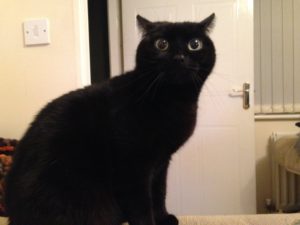Remember Remember Your Pets This November
 With Bonfire Night fast approaching it is worthwhile thinking about how our pets cope with fireworks and other loud noises. Fireworks are no longer limited to Bonfire Night, the firework season now lasts well past Christmas and into the New Year, so it is important to think now about how this impacts our pets.
With Bonfire Night fast approaching it is worthwhile thinking about how our pets cope with fireworks and other loud noises. Fireworks are no longer limited to Bonfire Night, the firework season now lasts well past Christmas and into the New Year, so it is important to think now about how this impacts our pets.
Loud, sharp noises such as thunderstorms, gunshots and fireworks which occur without warning can be incredibly traumatic for some pets. They do not understand where the sound comes from, or that it can’t harm them, and many develop phobias of sound or being outside in the dark. This can progress over time to more severe reactions, or reacting to other loud noises such as traffic. You might be able to tell if your pet is afraid if they display any of these signs:
 Hiding
Hiding- Cowering or shaking
- Pacing
- Panting
- Barking excessively
- Clinging to their owner
- Trying to run away
- Soiling the house
If your pet displayed any of these signs last year, now is an excellent time to prepare for the firework season. The following tips will help make your pet feel safe and secure, and will hopefully reduce their signs of fear.
Safe Haven: Provide your pet with a den or secluded area where they can hide, ideally somewhere quiet and away from windows. Make it safe and secure by adding blankets, cover all the sides except one and put their toys, food and water in with them.
Stay Indoors: keep cats indoors and don’t take dogs out for walks whilst fireworks are being let off. Being outside at this time can be very distressing for our pets, and may make their phobias worse. Closing windows and doors will reduce the noise and prevent pets from bolting.
Microchipping: Loud noises may cause fearful pets to bolt. In the event that they are lost it is much easier to reunite them with their owners if they are microchipped. Ensure your details are up-to-date with the microchip company.
Distractions: turn the tv or radio up louder to try and mask the noise and distract your pet with new toys or a chew.
Give your pet confidence: although we naturally want to comfort our pets when they are afraid, this will actually tells them that there is something to be afraid of and may make things worse. Our pets are very sensitive to our emotions so if we are confident and relaxed it tells our pets to be confident and that there is nothing unusual to be afraid of. It can be very frustrating if fearful pets are destructive or soil in the house, but remember never to scold or punish a fearful pet, it will make their phobia worse.
Pheromones: Synthetic pheromones can help relax and reassure worried pets. These are plug in diffusers which release a specific scent that only the dog or cat can smell and tells them they are safe. They are also available in collars (dogs only) and sprays.
Food Supplements: these natural, non-medicated supplements can work very well in some pets, encouraging them to relax.
In the event that the above tips are not enough to relax your pet and prevent their fearful behaviour, veterinary advice should be sought. It may be that anti-anxiety medication is required and can be prescribed in appropriate patients. In the past, sedatives were prescribed to help pets but this is no longer recommended as it does not remove their fear. Sedatives prevent anxious pets from going to their safe haven and expressing normal behaviour, and can lead to more dangerous fearful behaviour such as biting.
Looking forwards
The best method to reduce noise phobias longer term is by using desensitisation. CDs which play a range of sounds are available to be played in the home, initially very quietly until the dog becomes used to the noise. The volume can be gradually increased, with praise and treats to reinforce that the noise is nothing to be worried about. We recommend also using these to socialise puppies and prevent noise phobias developing.
Please feel free to call the surgery on 01606 880890 for more information, or to discuss your pet specifically.
